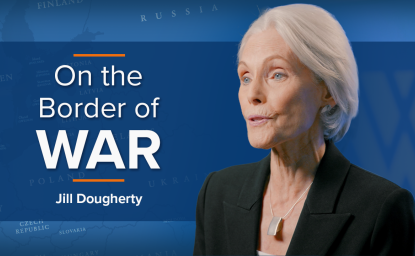Rev. Avery Dulles, the first American theologian named to the College of Cardinals, was a fellow at the Wilson Center in 1977. He was invited to the Center by then director James H. Billington and spent his time working on Models of Revelation, one of 21 books that he has written.
Dulles shared some of his memories from his time at the Center as well as his thoughts on his recent appointment with the Center's web editor.
"Most of the scholars were working on questions related to international affairs, but I found it interesting to meet with them because I have some backround in that area even though my own project was strictly theological."
Dulles indeed has a background in international affairs, descending from a long line of statesmen. During the Eisenhower administration, his father, John Foster Dulles, served as secretary of state while his uncle, Allen W. Dulles, was the CIA director. His great-grandfather had also been a secretary of state, as had Robert Lansing, a great uncle.
But Dulles chose a different path. "I deliberately did not want to get into the same field," he says. "I suppose I didn't want to compete with them, but I knew my interests weren't in the same direction."
A self-professed agnostic in 1936, Dulles entered Harvard, studying medieval art, philosophy, and theology. It was during this time that he began what he calls a gradual, rational process of conversion. Upon graduation in 1940, he entered law school for a year and a half before being called for active duty by the U.S. Naval Reserve. It was also in 1940 that he converted to Catholicism, a move that shocked his Presbyterian and prestigious family. During his time with the Navy he knew that upon his return home, he would again take a different path. "When I became a Catholic, I wanted to devote myself as fully as possible to my new faith, which I though I could best do as a Jesuit."
Dulles entered the Society of Jesus in 1946 and was ordained into the priesthood ten years later while his father was secretary of state. After graduate studies in Rome, he earned his doctorate in theology from the Gregorian University in 1960. Rev. Dulles began what would be a prolific publishing career with his Testimony to Grace in 1946, considered one of the most powerful stories of conversion ever written.
By the 1970s he was one of the best-known Catholic theologians in the U.S. and was beginning to be regarded by many as the leading U.S. figure in Catholic systematic theology. It was during this ascendancy in academic circles that Dulles was granted a one-year fellowship at the Wilson Center. His proposed project was a book on faith, tentatively titled "The Dynamics of Faith." The final product of his work at the Center, Models of Revelation, was published in 1983. Like his earlier Models of the Church, Models of Revelation brought the insights of theological scholarship to a much broader audience.
Widely regarded as careful and cautious, but a highly articulate theologian, he has written hundreds of articles in addition to his 21 books, often injecting notes of moderation, balance, and historical perspective on hotly debated issues. In an article on American theology, he was described as a "bridge-builder" for the Catholic theological community and a "prince of concord, because [Dulles] has always affirmed the strengths of opposing positions and avoided the partisanship that foments discord."
When asked if he inherited his diplomacy from his father, he says, "I am anxious to work for reconciliation if it can be achieved without compromising the truth."
Dulles has spent most of his teaching career at three institutions teaching systematic theology: Woodstock College, The Catholic University of America, and Fordham University in New York where he is currently the Laurence J. McGinley professor of religion and society. Rev. Dulles seems quite fulfilled in his current position at Fordham. "I hope to continue to do my work as teacher, lecturer, writer. But I am of course at the disposal of the Pope if he wishes otherwise."
On his appointment, Dulles says that he expects that it is "chiefly honorary," a tip of the hat to American Catholicism which is growing in importance to the Church. According to Dulles, most cardinals belong to an inner core of important archbishops who advise the Pope when consulted. While "Jesuits," Dulles says, "do not aspire to ecclesiastical rank." Thus far, he has not been told what his assignment will be. If his providence holds out though, this new "assignment" won't cause any major disruptions to his life.
"So far as I can remember" he says, "I have never asked superiors for any assignment, but I have had the good fortune of always being assigned to places and tasks that I have found congenial."
Explore More
Browse Insights & Analysis
Combatting Cybercrime: Defending America's Security and Financial Future

Video: On the Border of War
